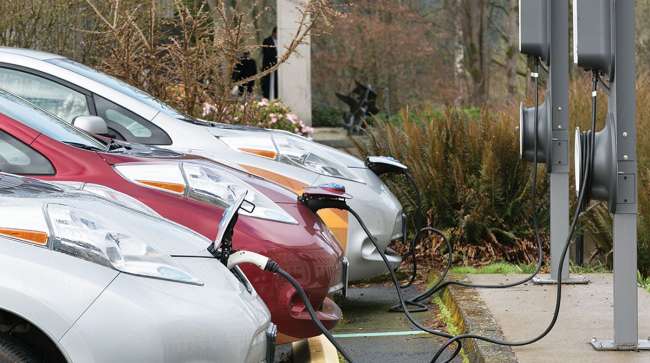Staff Reporter
States Prepare EV Charging Plans Ahead of Aug. 1 Deadline

[Stay on top of transportation news: Get TTNews in your inbox.]
With an Aug. 1 deadline looming, states are finalizing their electric vehicle infrastructure deployment plans.
Plans must be submitted to the Joint Office of Energy and Transportation. Then the Federal Highway Administration will approve eligible plans by Sept. 30 before funds are issued from the National Electric Vehicle Infrastructure Formula Program (NEVI).
With $1 billion earmarked annually from this year through 2026, NEVI funding is to be spent on projects directly related to vehicle charging and only for electric vehicle charging infrastructure that is open to the public or for authorized commercial motor vehicle operators from more than one company.
NEW: @ENERGY and @USDOT’s Joint Office of Energy & Transportation’s National Electric Vehicle Infrastructure Formula Program (NEVI) will help ensure our nation's future #EV charging network is accessible to all Americans. — DOE Office of Electricity (@DOEelectricity) June 14, 2022
The joint office is to create and maintain a public database that has EV charging stations based on geographical area, status and charging type.
Among the states seeking NEVI dollars are Arizona, Arkansas, Indiana, Ohio, Mississippi, Texas, Virginia and Washington.
Arkansas opened public comments July 12-19 to help shape its plan to capture $54.1 million from the NEVI program, which requires 40% be directed to help disadvantaged communities.
Expecting to receive $76.5 million federal funds over the next five years, Arizona’s DOT has been conducting public outreach in surveys and in-person public meetings.
NEVI Formula Program Guidance by Transport Topics on Scribd
Indiana convened a livestream event July 13 for DOT officials to familiarize residents with plans to spend nearly $100 million for EV charging stations.
Mississippi’s DOT nominated seven interstates (I-10, I-20, I-22, I-55, I-59, I-69 and I-269) as alternative fuel corridors.
Seeking public input since May, Ohio hopes to receive $20.7 million annually during the next five years to create an EV charging network over its 1,854 miles of FHWA-designated alternative fuel corridors.
Want more news? Listen to today's daily briefing above or go here for more info
Eligible for $407 million, Texas has determined 55 new locations for EV charging are needed to comply with a federal 50-mile maximum spacing requirement. However, distances could be greater than 70 miles between charging stations due to rural population centers and electrical supply locations in West Texas.
Virginia’s plan is to spend $100 million during the next five years to install public EV charging stations initially along I-64, I-66, I-81, I-85, I-95 and I-270 to offer convenient and accessible charging to support its EV growth. A VDOT survey is available for public comment through Aug. 1.
Washington state aims to receive $71 million in NEVI funds plus a 20% nonfederal match of $17.75 million. Priorities will include making I-5 and I-90 meet federally defined built-out standards for EV charging stations. Then it would complete the I-82, I-182 and U.S. Route 395 alternative fuel corridors, followed by U.S. Highway 101 and U.S. Route 195.




